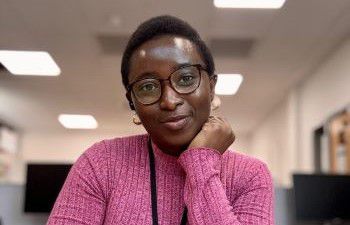Five minutes with Seyi Ugochukwu: “Three Minute Thesis helped me reconnect with the passion behind my research"
Posted on behalf of: Internal Communications
Last updated: Wednesday, 10 September 2025

Seyi, a postgraduate researcher in the School of Law, Politics and Sociology, won the Three Minute Thesis competition held during this year’s Summer of Research. Seyi’s winning presentation focused on her research about access to legal aid for undocumented migrants in the UK – find out more:
My research explores access to legal aid for undocumented migrants in the UK through a postcolonial lens. I focus on how colonial legacies continue to shape the experiences of migrants today, particularly those from former colonies. The aim is to uncover how legal structures, policies, and practices not only affect migrants’ access to justice but also reproduce historical hierarchies of exclusion. By centring the lived realities of undocumented migrants, my work seeks to highlight their voices and experiences, which are often marginalised in mainstream legal and policy debates.
Academically, I hope my work advances socio-legal and migration studies by embedding postcolonial perspectives into discussions of legal aid. Practically, I want it to shed light on systemic barriers, discrimination, and inequities within the UK’s legal aid structures, particularly for migrants from former colonies. By engaging with both policymakers and migrant support organisations, I hope my research can contribute to a fairer, more inclusive framework that recognises the specific vulnerabilities of undocumented migrants and works toward equitable access to justice. Ultimately, I want it to inspire meaningful reform and strengthen advocacy efforts for migrant communities.
The Three Minute Thesis competition was an invaluable experience because it forced me to distil complex ideas into clear, compelling language for a general audience. It also helped me reconnect with the passion and urgency behind my research, beyond the technical details. Winning was both encouraging and humbling, and it gave me confidence in communicating my work outside academic circles. Most importantly, the Three Minute Thesis reminded me that research should not only be rigorous but also accessible, sparking conversations with people who may not otherwise engage with topics like migration, coloniality, and access to justice.
My favourite thing about Sussex is its vibrant and inclusive intellectual community. The interdisciplinary environment encourages bold questions and unconventional approaches, which is vital for research like mine that cuts across law, history, and migration studies. I also really value the supportive atmosphere among postgraduate researchers because it feels collaborative rather than competitive. As for the campus itself, I love walking through the green spaces; it’s grounding and restorative, especially when I’m wrestling with big theoretical questions. The mix of academic rigour and natural beauty makes Sussex a very special place to study and grow.
Outside of my research, I enjoy spending time with family. I also love exploring music from across the African diaspora, which often provides inspiration and perspective on themes of migration, resilience, and identity. Cooking is another passion; experimenting with dishes from different cultures reminds me of how connected we are through shared histories and traditions. Beyond that, I make time for long walks, which help me recharge and return to my work with fresh energy and clarity.
The next stage of my research is the fieldwork, where I will engage directly with undocumented migrants, legal practitioners, and support organisations. This is the ‘nitty-gritty’ part of the project, where theory meets lived reality, and I’m both excited and humbled by the opportunity to learn from people’s experiences. Beyond the PhD, I aspire to continue working at the intersection of academia, advocacy, and policy, ensuring that my research contributes not just to scholarship but also to practical change. Whether within the University or beyond, I hope to remain committed to amplifying marginalised voices.
